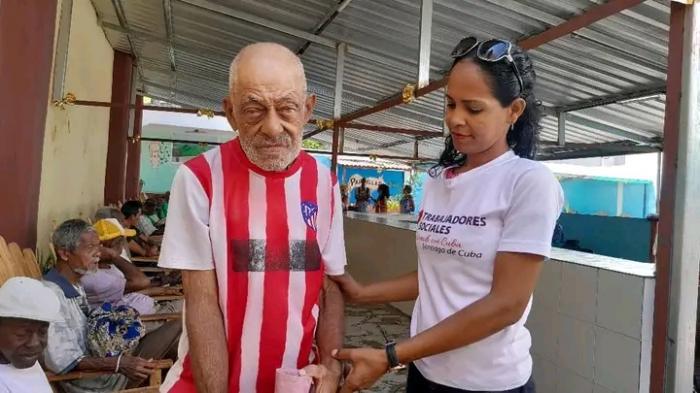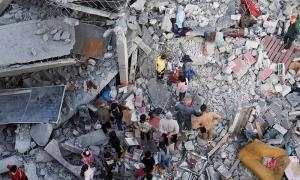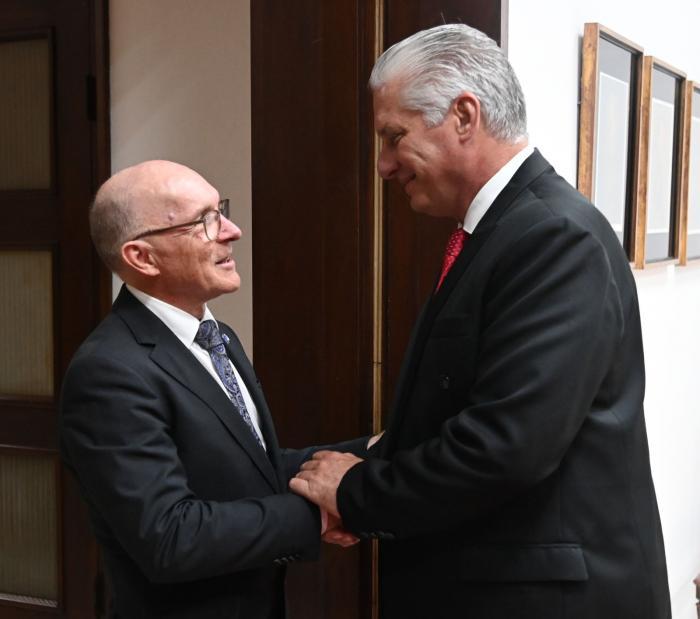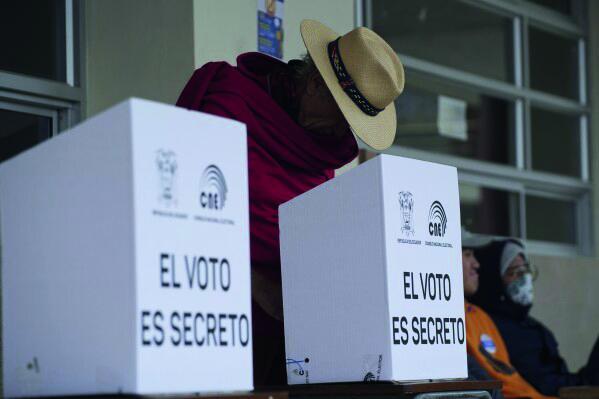


In the past, there were the endless walks through the streets of Santiago “and a little bit beyond”, dressed in rags and not knowing where to go, after the death of her mother. This is how Mirna's days went by, whose 50 years of age weighed like a century, “walking aimlessly, sleeping wherever the night took me, receiving mockery, rejection and also some weight until the Godmother found me to take me to the home where I have a new family”.
Now she sings and a smile distinguishes her, along with others who have birthdays and celebrate them, collectively, at the Community Center for social attention to people in vulnerable situations, state of abandonment or family absence, who wander or practice begging, located in the populous Heredia Street, in the Hero City.
“Of course, those of us who live in El Viso could not miss it, I invite others so that their situation improves, as mine has done”, said Cesar, who lives in the Provincial Center for the protection of people with wandering behavior, officially inaugurated on March 8.
The principle that in the revolutionary Cuba no one can be left homeless is endorsed in Article 70 of the Constitution, which refers to the protection of “persons without resources or shelter, unfit to work, who lack relatives able to help them; and families who, due to the insufficiency of the income they receive, so require it, in accordance with the law”.
However, the harmful effects of the covid-19 pandemic, the complex economic-commercial relations prevailing in the world and the consequences of the intensified economic, commercial and financial blockade against Cuba have led us, as a country, to rethink our strategies to respond to the aforementioned Article of the Magna Carta. In this regard, the system of social care and prevention is carrying out numerous actions, the results of which must be multiplied while they are being perfected.
LOVE AND THE WONDERS IT ENGENDERS
Liety Genesia Solas Benavides was trained in the Social Worker Program.
“I graduated as a Psychologist and continued as a social worker, but the passing of my little girl, just four years old, made me vow to serve others more fervently,” and she has been faithful to that conviction. Currently, she is the Coordinator of the Prevention Group of the Heredia popular council.
According to Liety, “being homeless is not always synonymous with poverty; on one occasion I saw a very close family member in a drunken state sleeping in the Plaza de Marte”.
The main political and governmental authorities of the untamed province promoted, with the help of the rest of the factors -especially with those of the communities-, what was originally called Enramadas en Revolución, and derived in the Con-Pasión project, said the Coordinator.
Some 50 people have joined this initiative who do have housing, but do not have family members or are not cared for by them, and who are living under the semi-internship regime.
Self-employed workers, the cooperative-peasant sector, schools and cultural and sports institutions have joined Con-Pasión. “It is something wonderful, which shows how much we can do for our most needy people; seeing them smile satisfies and makes us proud,” said the instructor of the children's folkloric group of the Culture House, Josué País García. “Here we guarantee breakfast, lunch, snacks, the provision of clothing and footwear, medical care, hygiene and beauty”, said Annia Charles Peró, member of the Prevention Group.
Similar actions are being developed throughout the province, “focused on some 300 people, up to 60 years of age, who have been identified as wandering or begging, and who have no family support. The elderly can be placed in Homes for the Elderly and other health institutions, since many of them have ailments associated with this behavior”, said Annia Limonta Limonta, deputy director of Prevention, Assistance and Social Work at the Provincial Directorate of Labor and Social Security (DPTSS).
The improvement of the Family Care System (SAF) is also a priority, in order to better serve the more than 5,100 beneficiaries of the Program, through its 126 centers, many of which have undergone investment processes, in urban and rural areas.
MORE THAN A CENTER, A HOME
In correspondence with the political will, “for a long time there has been a protocol that is updated and tempered, to attend to all those who are in a situation of vulnerability -whether temporary or lifetime-, depending on the causes and conditions. In all the people's councils and municipalities there are Prevention Commissions and multidisciplinary and multisectoral groups to evaluate and attend to each case”, said Ernesto González Ojea, director of the DPTSS.
However, it was essential to create a Center for the protection of these people which, although it had been operating de facto since the times of covid-19, this year “it is managed as a Budgetary Unit subordinated to the Provincial Government of People's Power, with the necessary conditions and personnel, because here, we not only attend, we protect”, said Oliana Hierrezuelo Marcilli, director of the institution located in the area of El Viso.
By 2025, the Provincial Government has earmarked ten million pesos for the Center, with a capacity for some 200 people who lack housing, family or those who can provide for their needs. “We have 70 workers, and multidisciplinary groups to provide for them materially and spiritually, because there are many stories, usually very sad ones, in every life that comes to us. The management of the province has informed us that, if necessary, the budget can be increased,” stressed Hierrezuelo Marcilli.
“Ours is a beautiful job; we practically become the family of each resident. They call me uncle or dad, it gives me joy and sometimes nostalgia, because my mother suffered from schizophrenia. Being here, serving, makes me feel useful as a Cuban and as a human being,” said Yasser Írsula Pérez, who works as an assistant to 14 women ‘who dance and sing,’ she said.
Like all the Dolores, Lola has a lot to tell. “My life has been hard, very hard, even going to the dumpsters. Luckily, those days are behind us; here we feel very good, we are well treated,” she said, with tears in her eyes.
LAWS THAT PROTECT WITHOUT DISTINCTION
“Law 160 provides that the Prosecutor's Office is responsible for the control of legality, among other issues, in the treatment of people in vulnerable situations, specifically in Article 12, paragraph l,” said Ládenis Ricardo Soria, head of the Department of Family Protection and Jurisdictional Affairs of the Provincial Prosecutor's Office of Santiago de Cuba.
Obviously, “among the people protected by these legal presumptions are those who have wandering behavior, who socially are in a situation of vulnerability. The Prosecutor's Office, as part of the control of legality, until the year 2021 had among its functions the representation of these persons, provided that they were in a situation of disability. Therefore, we have experiences of cases in which it was proven that third parties had affected rights, especially those related to patrimony, home ownership and certain income. With the modification established in Law 141, Procedural Code, the legal representation of these persons corresponds to the Family Defender”, explained the also specialist in Civil and Family Law.
However, she said, “we carry out control visits to the social protection centers where these people are sheltered, who require a multidisciplinary evaluation to define the actions to be taken in order to eliminate the causes and conditions that motivate their wandering”.
The Ombudsman's Office is a structure of the Ministry of Justice, whose mission is to protect, guarantee and restore the exercise of the rights of people in situations of socio-legal vulnerability.
“No one has the right to sleep peacefully while there is a man, a single unhappy man”, said our National Hero, so that it is up to society as a whole to ensure that the rights of its members are not violated, under the leadership of institutions to which, by social mandate, it is incumbent upon them.
The economic situation of the country may be complex, and, undoubtedly, remarkable exercises of thought are made to reach, with what we have, the greatest possible number of people. However, in the midst of such constraints, human dignity continues to be a priority, and no resources are spared, no matter how meager they may be. It is a perfectible work, which still does not reach everyone, but the road that remains to be traveled, the pending ones, do not demerit in any way every effort to accompany, help, protect and give love to those who need it most.





